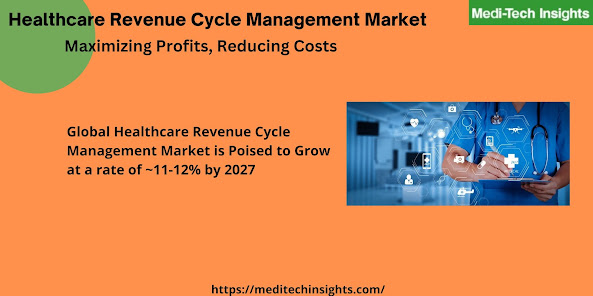Global Healthcare Revenue Cycle Management Market is Poised to have a High Growth rate of ~11-12% by 2027
Increasing demand for workflow optimization in
healthcare organizations, increasing regulatory requirements and government
initiatives aimed at promoting the adoption of healthcare RCM solutions, rising
adoption of cloud-deployed healthcare RCM, growing strategic initiatives associated
with healthcare revenue cycle management, and increasing revenue loss due to
billing error and declining reimbursement are
some of the key factors driving the global Healthcare Revenue Cycle Management market.
Healthcare Revenue Cycle Management is the process of identifying, collecting, and managing the practice’s revenue from payers based on the services given. A successful healthcare RCM process is critical for a healthcare practice to maintain financial viability and continue providing quality patient care.
Increasing
Potential of RCM Outsourcing in Healthcare Drives the Healthcare Revenue
Cycle Management
Market
Leveraging technology provided by outsourcing partnerships can offer various advantages, including streamlined workflows, Improved efficiency, focus on patient care, timely and improved reimbursement, error-free billing, improved payments, and accuracy, all of which can lead to reduced costs and increased revenue collection. Thus, the companies are steadily adopting digitally enabled modular solutions to renovate their healthcare RCM operations by collaborating with third-party service providers who can integrate people, processes, and technology into one robust healthcare revenue cycle solution.
Growing
Adoption of RCM Solutions in Healthcare Fuels Its Demand Driving the Healthcare Revenue
Cycle Management
Market Growth
A healthcare
organization's operational success relies on having a streamlined and effective
revenue cycle. Healthcare revenue cycle management (RCM) aids healthcare
organizations in enhancing their cash flow, boosting staff productivity,
enhancing the patient experience, maximizing revenue, preventing financial
losses, cutting costs, increasing efficiency, and meeting regulatory obligations.
Thus, a clinically driven revenue cycle empowers organizations to drive
results, like limiting denials, increasing clean claim rates, minimizing
re-work, and lessening the chance for delayed or missed reimbursement
opportunities.
By integrating next-generation digital technologies, vendors can enhance
consumer centricity, improve patient touch-points, optimize reimbursement, and
minimize denials to improve cash flow across the healthcare ecosystem. The most
significant healthcare RCM trends that will amplify the organization's
financial health are:
· The Vital Role of Data Analytics in the Healthcare
Revenue Cycle
· More Focus on a Patient-centric Approach by Medical
Practices
· Payment Reforms
Key
Hurdles that the Healthcare
Revenue Cycle Management
Market Faces
High pricing and
maintenance of Healthcare RCM solutions, inadequate IT infrastructure,
constantly changing healthcare regulations, complex reimbursement models that
are introduced every few years, collecting payment from patients, tracking a
claim through its entire cycle, and staff training are several of the key factors
that are likely to hinder the growth of the market in the forecast period.
North
America Expected to Continue to Hold a Major Share in the Healthcare Revenue Cycle Management Market
From a geographical outlook, North America holds a
major chunk of the Healthcare Revenue Cycle Management market. This can be Primarily
attributed to the increasing adoption of Healthcare RCM in healthcare, the
increasing adoption of cloud-based solutions, the rising demand for management
of unstructured healthcare data, the increasing adoption of electronic health
records, and the presence of key players in the region.
Competitive Landscape Analysis of the Global Healthcare Revenue Cycle Management Market
Few of the key
players operating in the market include The SSI Group LLC, Veradigm Inc, R1 HEALTHCARE RCM Inc, and
McKesson Corporation, among others.
Organic and Inorganic Growth Strategies Adopted by
Players to Establish Their Foothold in the Healthcare RCM Market
Companies operating in this market are adopting organic and inorganic growth strategies such as collaborations, acquisitions, and new product launches to gain market share. For instance,
· In January 2023, Optum and Owensboro Health announced entering into a partnership to enhance patient care and experience while meeting the community’s evolving healthcare needs
· In August 2022, R1 RCM Inc. announced that they have entered into a 10-year partnership with St. Clair Health to serve as its main provider of end-to-end Healthcare Revenue Cycle Management services
Get Detailed Insights on the Global Healthcare Revenue Cycle Management Market @ https://meditechinsights.com/healthcare-revenue-cycle-management-market/




Comments
Post a Comment